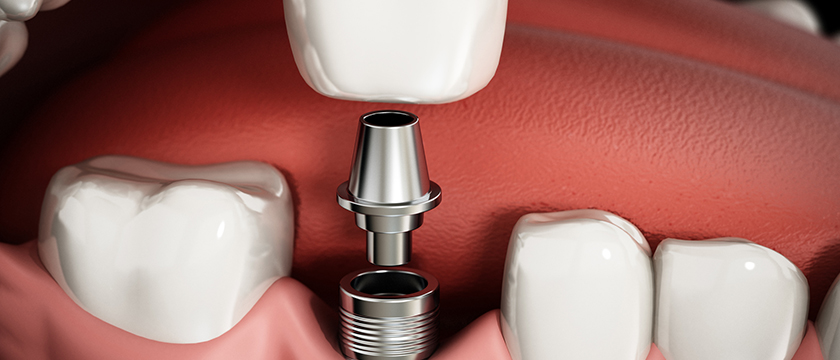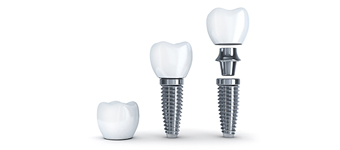 05 Dec 2022
05 Dec 2022
Many people who are thinking about getting dental implants feel apprehensive about the process. With so many unknowns to contend with, this is no surprise. Learning more about dental implants and the procedure needed to place them can put your mind at ease and help you discover if they are right for you.
This guide will tell you everything you need to know about dental implants, including who can get them, which types of implants exist, and what you need to do to prepare for the procedure.
The Ideal Candidate for Dental Implants
Most people can get dental implants to replace a missing tooth, but not everyone can safely undergo the procedure. The best candidates:
- Have enough healthy bone tissue to support the implants or are in good enough health to receive a bone graft
- Have healthy gums with no active gum disease
- Have good overall oral health with no untreated tooth decay
If you do not meet these requirements but still want to receive an implant, talk to your dentist. They can help you take steps toward becoming a good implant candidate in the future.
What Are the Different Types of Dental Implants?
Endosteal
Endosteal implants are implants that are anchored to the jawbone using a titanium screw. These are the most common type of implants due to the many benefits they offer. Not only does anchoring the implant to your jaw offer better comfort and functionality, but it also provides stimulation to the jawbone to prevent future bone loss.
Subperiosteal
Subperiosteal implants are very similar to endosteal implants, but the screw that holds them up is placed just under the gums instead of inside the jawbone.
These types of implants can provide passable results, but they are not nearly as stable or functional as endosteal implants. Their main benefit is that patients can receive them even with advanced bone loss.
Many dentists do not perform subperiosteal implants except in rare circumstances. Ideally, people who do not have enough jawbone for an endosteal implant should be given a bone graft to correct this problem. If this is not possible, a subperiosteal implant may be an option.
Single Stage
Single stage implants are placed in a single surgical appointment. A long implant screw is inserted into the jawbone and left exposed above the gumline. Then, the patient is given time to heal. Once they are fully healed a few months later, the implant is attached to the exposed part of the screw.
Two Stage
Two stage implants are placed in two surgical appointments. During the first, the dentist installs the main part of the implant screw in the jawbone. The top of this screw will be covered by the patient’s gums during the healing process. The second appointment removes the gum in this area and places a connecting piece that will hold the implant crown. This procedure is more complex than single stage implants, but it offers a better fusion of screw and jawbone.
Dental Implant Materials
Titanium Dental Implants
Titanium dental implants are the most common type of implant. This is because titanium is highly biocompatible and allows bone to grow around it, making it easier for it to fuse properly with your jawbone. Many modern titanium dental implants are actually made from titanium alloy, making them safer for people who are allergic to pure titanium.
Zirconia Dental Implants
Zirconia dental implants are made from the same material as many dental bridges and crowns. This material has not been used for implants for very long, so it lacks the same scientific support as titanium. Dentists have observed that it is more brittle than titanium but integrates almost as well with human bone. It is also rust-resistant and light-coloured, making it the superior aesthetic choice.
Potential Issues During the Dental Implant Procedure
Some potential issues that may arise during the dental implant procedure include:
- Loose Implants. If the bone does not heal properly around an implant, it may become too loose to be useful. When this happens, dentists remove the implant screw, allow the bone to heal, and try again later when the bone is stronger.
- Periimplantitis. This condition damages the bone around the implant and causes the implant to fail to attach properly. When this happens, the implant is typically removed, and the patient undergoes a bone graft before trying the procedure again.
- Fractures and Wear. In some cases, the implant screw may fracture or wear down prematurely. If the problem is severe, the patient may need to choose an alternate course of treatment.
- Nerve and Tissue Damage. If an implant is placed near one of the many nerves in the mouth and face, that nerve may sustain permanent damage. This can cause lasting numbness and chronic pain.
- Rejection. Like a transplanted organ, a patient’s body may reject the implant screw. This means that the screw will need to be removed.
- Allergic Reactions. Some people are allergic to the materials used in implants. Your dentist should test you for relevant allergies before conducting the implant procedure.
What to Expect as a Patient
Before receiving a dental implant, you will need to:
- Undergo a full dental examination to make sure your mouth is healthy enough for the procedure
- Discuss all your medications and pain management needs with your dentist
- Review the plan for your surgery with your dentist, so you are prepared for all steps of the process
- Schedule the date of your surgery
After the procedure, you will likely feel tired as the anesthesia begins to wear off. After this, you will feel some discomfort that you can manage by taking your prescribed pain medication. You may experience mild swelling, bruising, and bleeding during the healing process.
A few months later, you will need a second surgery to attach the implant’s connector hardware. This time, the dentist will open your gums and place the connector above your gumline. Once this heals, you will receive your implant crown, and the procedure will be over.
Pre-Care Requirements
Before your surgery, you will need to:
- Discuss all the medications you are taking with your dentist. You may need to stop taking some medications temporarily or lower your dose to avoid complications.
- Stop smoking and drinking alcohol for at least two weeks before your surgery. This will ensure that your body can heal properly.
- Brush, floss, and rinse diligently. Your oral health should be in optimal shape by the time your surgery is scheduled.
- Plan how you will get home from the dentist’s office. It will be unsafe for you to drive after the procedure, so it can help to arrange a ride with someone.
- Gather all the items you will need for your recovery. Stock up on foods like soup and pudding, and get your prescribed medication filled at your pharmacy.
Dental Implants in Mississauga
 Getting dental implants in Mississauga is much easier than many people think, so what are you waiting for? Call Trillium Smile Dentistry today. Our expert staff and glowing reviews make us a top choice for people searching for dental implants near where they live. Contact us to book an appointment or receive more information on the procedure, the cost, or anything else you would like to know.
Getting dental implants in Mississauga is much easier than many people think, so what are you waiting for? Call Trillium Smile Dentistry today. Our expert staff and glowing reviews make us a top choice for people searching for dental implants near where they live. Contact us to book an appointment or receive more information on the procedure, the cost, or anything else you would like to know.
